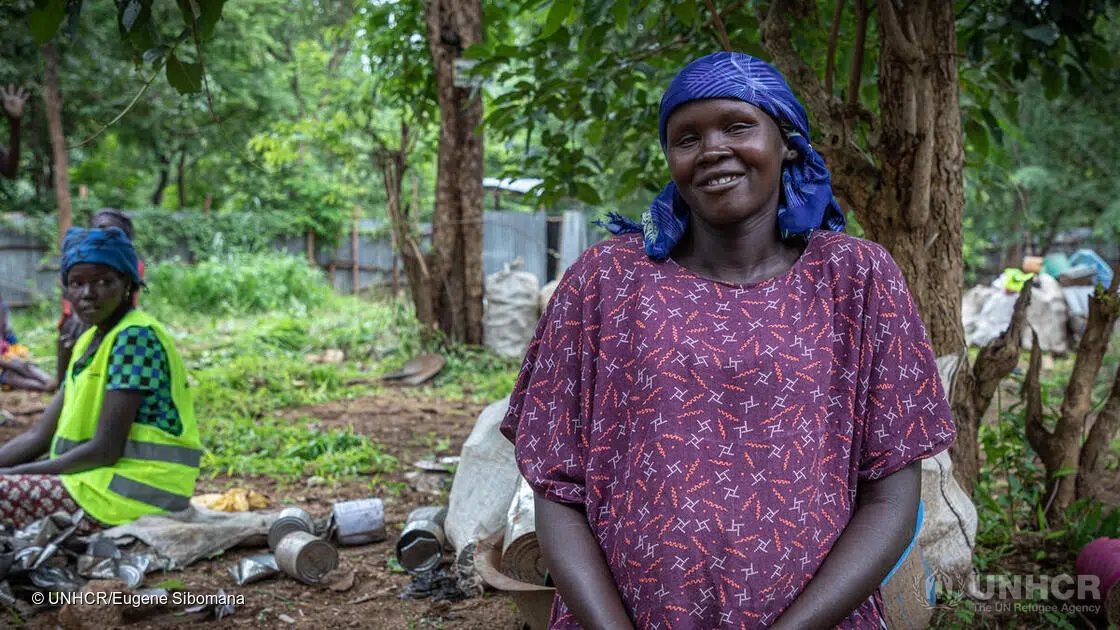
Nyabang, 31, is a refugee from South Sudan. Despite her own difficulties, she volunteers to keep the environment clean in Jewi camp, Gambella, Ethiopia.
$200,000 gift from the Trottier Family Foundation provides sustainable energy solutions in Ethiopia and humanitarian support globally.
The ability to have access to safe and sustainable energy is a basic human need, but for far too many people forced to flee, this essential for daily living is not a certainty.
More than 90 per cent of refugees in camps worldwide have limited access to electricity, making it difficult for them to cook, keep warm, learn, work, or find their way around at night, while also exposing them to various protection and health risks.
A lack of clean energy results in many refugees burning firewood or charcoal to meet their critical, household needs, while community and support facilities are often fueled by diesel generators. All these sources of energy have heavy environmental and financial costs.
Thanks to the generosity of Montreal’s Trottier Family Foundation, their donation to UNHCR is helping bring light to the lives of thousands of refugees in Ethiopia, affecting the way they live, eat, work and study. Over the past two years, UNHCR has been able to distribute 1,000 solar lanterns to refugees in Gambella and install 30 solar streetlights in nearby Benishangul-Gumuz Region. This has had an immediate impact and offers an important shift forward in providing safety and wellbeing to displaced families living in profound uncertainty.
In Ethiopia’s refugee camps, access to safe, sustainable, and durable sources of energy has remained a major concern over the years. The main source of energy is firewood which is very limited in the hosting areas, and natural forests are being cut to meet people’s immediate energy needs. Scarcity of fuelwood is then closely linked to natural resource-related conflicts with hosting communities
Travelling long distances in search of firewood exposes women and girls to gender-based violence, physical attacks, and harassment. Women and children can also spend long periods of time preparing and cooking food which exposes them to high levels of indoor smoke emissions and increases cases of upper respiratory tract infections and incidents of accidental fire burns. To make matters worse, refugees often find themselves forced to sell part of their food ration to meet domestic energy needs and this increases malnutrition in the household.
Alex Tom, Head of UNHCR Canada’s Private Sector Partnerships says, “More and more, we are needing to consider not just responding to a crisis, but how we should respond. Coming in with the same responses despite a changing reality is something we are hoping to move away from, and donations like this from the Trottier Family Foundation help us do exactly that.”
This solar lighting project tackles the many risks associated with scarce access to domestic energy in displacement head on. This is the type of transformative initiative that the Trottier Family Foundation is proud to support as it continues to expand its reach in bringing sustainable solutions to the world, from urban centers to refugee camps.
“We are going to be seeing more and forced displacement in the years to come. Climate change, as we know, is hitting the world’s most vulnerable populations first, and it is hitting them hard,” says Eric St-Pierre, Executive Director of the Foundation.
“When they are forced to flee, they cannot be asked to not only survive but to also think about the health and environmental impacts of how they live. If we have an opportunity to contribute to their well-being in a way that also supports the work to reverse climate change, that is the kind of initiative we are excited to support.”
Building on their meaningful gift towards creating energy solutions in Ethiopia, UNHCR Canada is grateful to the Trottier Family Foundation for also including $100,000 in flexible funding to UNHCR’s ongoing response to humanitarian emergencies around the world. Flexible funding is the most effective way to support UNHCR’s response to the global refugee crisis and the Trottier Family Foundation’s combined flexible and targeted support is playing a pivotal role in providing protection and solutions for displaced people in a complex world.


